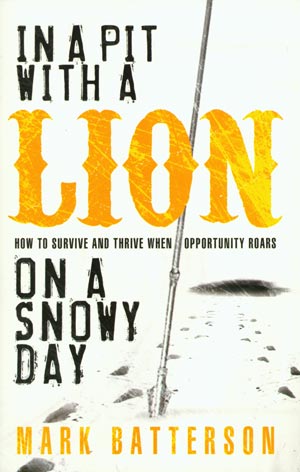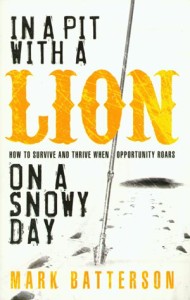Over black beans and rice with a side of Greek yogurt (which I threw out after a single bite) (note to self: check the Greek yogurt’s date before you eat the Greek yogurt) during my lunch break today, I finished In a Pit With a Lion on a Snow Day: How to Survive and Thrive When Opportunity Roars.
The book, by Mark Batterson – lead pastor of National Community Church in Washington, DC – is the twelfth I’ve read in full in 2012. The title is based on a story from the book of 2 Samuel, about a warrior named Benaiah who chased a lion into a pit on a snowy day… and killed it.
The point Batterson makes about Benaiah is this: while risky and perhaps irrational to chase a lion into a pit on a snowy day, having done it opened doors for him that otherwise would have stayed shut. And the parallel the writer points out is that sometimes, we are compelled to chase our own “lions” into “pits” on “snowy days” and a lot of the times, we just chicken out.
But, he wrote, Christians are called to be lion chasers. And he made some great points throughout the book. Here are some of my favorite excerpts:
On spiritual maturity:
“Maybe we’ve measured spiritual maturity the wrong way. Maybe following Christ isn’t supposed to be as safe or as civilized as we’ve been led to believe.” -page 16
On stewardship:
“At the end of the day, success equals stewardship and stewardship equals success. But our view of stewardship is far too parochial. Sure, how we manage our time, talent and treasure is a huge stewardship issue. But what about being a good steward of our imagination? Or our medial ventral prefrontal cortex (the seat of humor, according to neurologists)? Or how about stewardship of our sex drive and competitive streaks? Stewardship is all-inclusive. We’ve got to be good stewards of every second of time and every ounce of energy.” -page 17
On prayer:
“Too often our prayers revolve around asking God to reduce the odds in our lives. We want everything in our favor. But maybe God wants to stack the odds against us so we can experience a miracle of divine proportions. Maybe faith is trusting God no matter how impossible the odds are. Maybe our impossible situations are opportunities to experience a new dimension of God’s glory.” -page 24
“In his Letters to Malcolm, C.S. Lewis said, ‘If God had granted all the silly prayers I’ve made in my life, where would I be now?’ Lewis went so far as to say that someday we’ll be more grateful for our prayers that didn’t get answered than the ones that did. The reason for this is simple: Many of our prayers are misguided. We pray for comfort instead of character. We pray for an easy way out instead of the strength to make it through. We pray for no pain, when the result would be no gain. We pray that God will keep us out of pits and away from lions. But if God answered our prayer, it would rob us of our greatest opportunities.” -page 64
On fear:
“What’s interesting is that psychiatrists posit that we’re born with only two innate fears: the fear of falling and the fear of loud noises. That means that every other fear is learned. And more importantly, that means that every other fear can be unlearned.” -page 47
“The cure for the fear of failure is not success. It’s failure. The cure for the fear of rejection is not acceptance. It’s rejection. You’ve got to be exposed to small quantities of whatever you’re afraid of. That’s how you build up immunity.” -page 50
“One of the greatest things that could happen to you is for your fear to become reality. Then you would discover that it’s not the end of the world. Your fear is worse than the actual thing you’re afraid of.” -pages 50-51
On seeking God with intensity:
“There is no way (the disciples) could have predicted what was about to happen. You can’t plan Pentecost. But if you seek God for ten days in an upper room, Pentecost is bound to happen. Here is a novel thought: What if we actually did what they did in the Bible? What if we fasted and prayed for ten days? What if we sought God with some ancient intensity instead of spending all our energy trying to eliminate His surprises? Maybe then we’d experience some ancient miracles.” -page 83
On complaining:
“Instead of complaining about the current state of affairs, we need to offer better alternatives. … As the old aphorism suggests, we need to stop cursing the darkness and start lighting some candles.” -page 122.
– – – – –
Click here to read about all the books I read in 2012.
Click here to learn more about In a Pit With a Lion on a Snowy Day.


